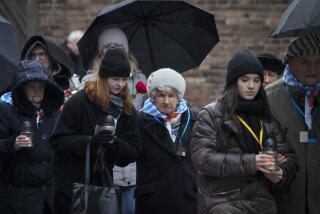In Hong Kong, 50,000 Mark Tiananmen
- Share via
HONG KONG — More than 50,000 people gathered here Wednesday in a shimmering constellation of candlelight in what may be their last chance to publicly honor pro-democracy protesters who died in and near Beijing’s Tiananmen Square eight years ago.
The annual candlelight vigil, held 26 days before China will resume sovereignty over this colony, drew thousands more to harbor-side Victoria Park than last year’s rally and sparked vows that no matter what new limits the incoming government may institute, the gatherings will continue.
“Some people say that Hong Kong people are only interested in making money,” said Democratic Party leader Yeung Sum, addressing the throngs whose candles shone as brightly as Hong Kong’s glittering skyline. “See how many Hong Kong people are here? We will never forget.”
Shanghai dissident Bao Ge, who was released Wednesday after serving three years at a labor camp, listened in on the vigil by telephone. After he went home, he called a friend who was at the rally and listened to Hong Kong participants singing songs about freedom via cellular phone.
Hong Kong’s incoming legislature has drafted laws banning public assemblies that threaten “national security”--a category that theoretically could be applied to Wednesday night’s commemoration, whose leaders called for an end to China’s one-party rule and for the release of those arrested for their role in the pro-democracy movement.
Earlier this week, Hong Kong’s leader-in-waiting, Tung Chee-hwa, urged people to “put down the baggage” of Tiananmen and “look ahead.”
In Beijing, Tiananmen Square itself was nearly empty Wednesday, patrolled by soldiers and plainclothes police. But neither Hong Kong nor Beijing can seem to leave the ghosts of Tiananmen behind. To many, June 4, 1989, the day that hundreds, maybe thousands, of unarmed protesters--as well as some soldiers--died during the suppression of pro-democracy demonstrations, is the moment that most sharply redefined the way China and Hong Kong view each other.
“We watched what was happening in China,” said designer Sherie Siu, 36, cupping a candle. “It was horrible, unthinkable, that the soldiers could shoot their own people. And then we thought: That could be us tomorrow.”
The crackdown shattered many Hong Kong residents’ faith in the territory’s future under Beijing’s rule. In turn, the territory’s emotional and outraged protests involving more than a million people rocked Beijing’s expectation that it would inherit from Britain a complacent, apolitical territory.
The resulting mutual mistrust has come to a head just weeks before Hong Kong returns to the motherland--and nearly all of the issues causing friction in the impending transition emerged from the crucible of June 4.
“It’s difficult to forget June 4,” said Paul Yip, a senior advisor to Tung, the incoming chief executive. “It was critical for making Hong Kong what it is now.”
In the months after the 1989 crackdown, new political groups emerged in Hong Kong, such as the popular Democratic Party and the sponsor of Wednesday’s rally, the Hong Kong Alliance in Support of the Patriotic Democratic Movement in China. Hong Kong’s government hastily erected institutional firewalls to protect the territory’s freedoms--creating a Bill of Rights, lifting restrictions on demonstrations and expanding the number of people eligible to vote.
To Beijing, these were subversive groups and destructive acts meant to undermine Hong Kong’s smooth transition back to Chinese rule. Evidence of Hong Kong’s financial support of the protesters, and the territory’s role in smuggling dissidents and student leaders out of China, reaffirmed Beijing’s view.
Today, as China prepares to resume control of Hong Kong, the incoming government--made up of Hong Kong residents approved by Beijing--is planning to dismantle post-Tiananmen protections. “We can’t allow Hong Kong to become a base of subversion,” Tung has said.
After July 1, the elected legislature will be replaced by an appointed one that will pass laws to ban foreign funding of political parties and restrict disruptive public gatherings. The Hong Kong Alliance and other groups branded as “subversive” by Beijing are expected to be outlawed.
Voter eligibility will be narrowed. Those with foreign passports will not be able to hold top government posts. Dissidents will have to “move on” after the hand-over, Tung said this week.
The changes would not be so dramatic if there had been no Tiananmen, said student Kwan Chi-kong, 26. “But what happened on June 4 showed us the true suppressive nature of the Chinese government. You can’t put back on the blindfold.”
One of the positive legacies of Tiananmen is that it revived Hong Kong’s sense of Chinese identity, said Lau Chin-shek, a spokesman for the Hong Kong Alliance.
“Hong Kong people used to consider themselves as Hong Kongese, separate from mainland China,” said Lau, whose group also helps escaped dissidents resettle overseas. “But June 4 united the Hong Kong people and the mainland Chinese, rendering Hong Kong no longer independent.”
The 1989 crackdown also spurred Hong Kong into standing up for itself, said trader Vivian Leung, 35, who came to Wednesday’s vigil. “We want to tell the world we’re guardians of our own city,” Leung said. “We can’t be afraid of the future, because we have to be here.”
Francis Wong, a Hong Kong teacher, brought his 12-year-old son to the rally to show him what it means to be patriotic.
“To love a country and love the ideology are two different things,” Wong said. “China is our country; this will never change. But no dynasty will last forever--that is a historical rule. If it is unhealthy and unwanted by the people, it will collapse.”
Silvia Cavallini and Min Lee of The Times’ Hong Kong Bureau contributed to this report.
More to Read
Sign up for Essential California
The most important California stories and recommendations in your inbox every morning.
You may occasionally receive promotional content from the Los Angeles Times.













